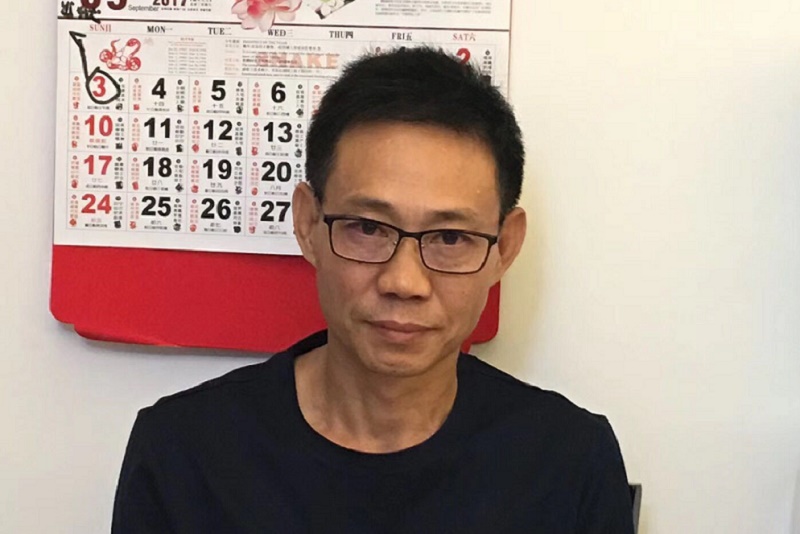After being released from in prison in 2014, Meng Han immediately vowed to continue fighting for workers’ rights in China. Now, after completing another prison sentence on 3 September, it is clear that nothing has changed.
“The workers own this country,” Meng wrote in a now deleted blog post on 20 September. “If our actions are a crime, then I’m willing to take that risk and continue helping the workers solve their problems!”
Meng concedes that his lifelong devotion to the workers’ movement in China has brought him considerable personal pain and suffering but states unequivocally: “This is not my pain; this is the pain of our times!”

Meng Han at home with the calendar marking his 3 September release date
In his 10,245 character post, Meng retraces the path that led him from a 2013 Guangzhou hospital protest to his involvement in the Panyu Workers’ Centre, the struggle of the Lide shoe factory workers in 2015, his arrest, and the apparent desire of the authorities to crush civil society labour organizations in Guangdong.
It was during the struggle of the security guards at the Guangzhou Chinese Medicine University Auxiliary Hospital for proper employment contracts and social insurance that Meng first came to prominence as labour activist. After their employer refused to negotiate, Meng led his colleagues in a rooftop protest in August 2013; an act of defiance that earned him a nine month prison term.
Released on 18 May 2014, he almost immediately went back to work, joining the Panyu Workers’ Centre, which at the time was at the forefront of the workers’ movement in Guangdong. In his blog, Meng reminisces fondly about those times: the weekly picnics organised by the centre’s staff, the movement’s dynamic and motivated leaders; even the obstacles they faced, such as some workers collaborating with the authorities, were all outweighed by their own drive and determination.
Meng remains immensely proud of achievements of the Panyu Workers’ Centre in helping the Lide shoe factory workers emerge from a perilous and solitary fight to create a dynamic, inclusive movement that ended up victorious and provided an example of success for other workers to draw inspiration from. As a result of all the attention the protest received on both social and traditional media, Meng says, the centre helped to increase popular awareness and understanding of labour issues and shift the workers’ movement from a position of weakness to one of strength.
Meng also discusses in his blog the difficulties he faced during his imprisonment. His health deteriorated due to an illness he contracted and because of continual police mistreatment. He lost count of the number of times he was brought in for questioning, at any time of the day or night, and was appalled by the authorities’ perverse desire to obtain compromising information about his individual colleagues and the organisation as whole. He condemns their actions as downright “persecution” and states that the “judgement [in their case] was delivered from the moment the crackdown started.” Meng describes the shame of betraying his most cherished values and the loss of dignity he felt during his trial. He calls it a “farce” in which he put on a “bad performance” but says he finds comfort in the knowledge that there was only one possible outcome: “Our imprisonment was the best resolution possible.”
Meng ponders his own future in labour activism and the broader issue of civil society in China. From the government’s perspective, he realises that the word non-governmental organization (NGO) is now tainted with negative connotations. Moreover, he concedes that he and his colleagues from the Panyu Workers’ Centre will always be associated with criminal activities, no matter what they do in the future.
Despite this, Meng believes that labour NGOs still have a vitally important role to play. Workers’ protests, he says, are rooted in a great injustice: for years, the government has strived for economic growth and prosperity but has completely ignored the workers who created that prosperity. Now, he says, the government is desperately trying to quash the only way workers have of expressing their grievances and this has created a dangerous and volatile situation in which reckless protest can lead to workers losing their freedom, their health, and sometimes even their life. Meng says it is still his mission and that of labour NGOs in general to prepare workers across China for the struggle ahead and help them to organize collectively and effectively.
Meng states emphatically that worker protests are about workers’ dignity and their desire for decent work, and he pointedly asks “why does the government condemn these acts as illegal?” Meng notes that the Lide workers had been hailed as heroes in the media and on the internet. However, he had “wrongly assumed that everybody understood that.”
A full translation of Meng Han's blog post can now be seen in two parts at China Change. Part One Part Two.
